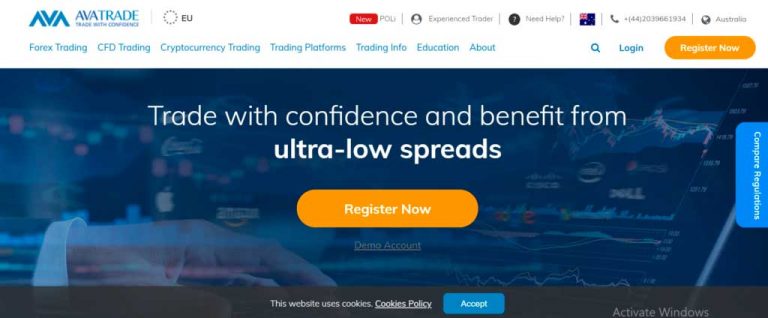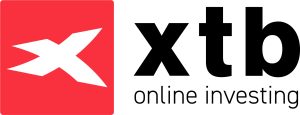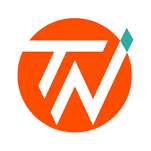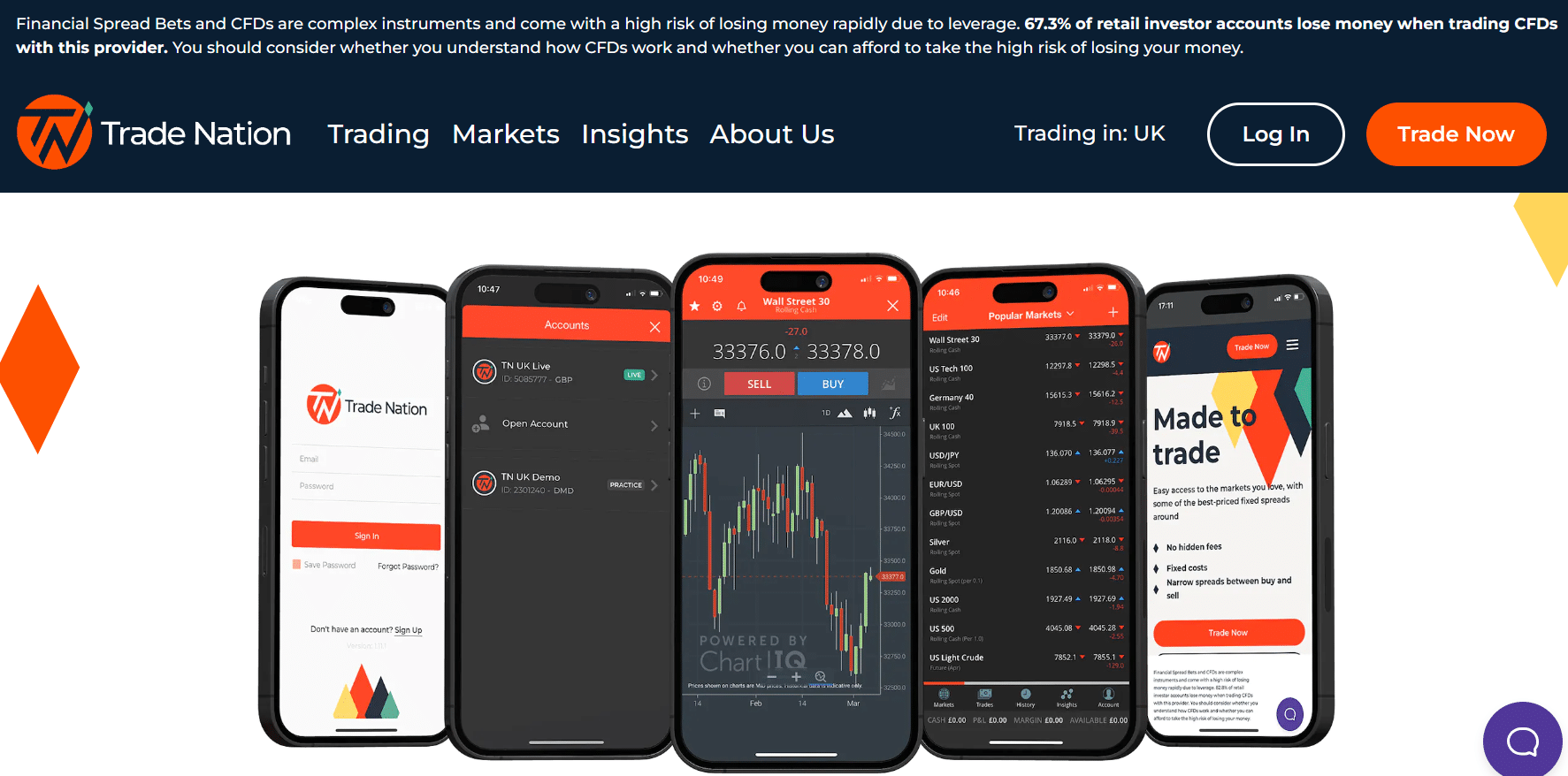Forex Brokers UK 2026
Forex trading is a popular forms of trading, especially for beginner traders. This is because it is the biggest market with the maximum liquidity. In addition to this, currency pairs are already familiar to people, so it is much simper for them to start with forex trading. The important thing when trading forex currency pairs is your strategy and your mental strength.
However, there is another factor that makes all the difference in how successful you will be as a forex trader, and this is a factor that is often overlooked. This is the selection of the right broker for your forex trading needs. In this guide, we have discussed and reviewed forex brokers in the UK for you, based on your needs and requirements.
Best Forex Brokers in the UK 2026
There are several different brokers available in the market that you can use for your forex trading requirements. However, you need to make sure that you are using suitable brokers available in the UK. A list of some brokers available has been given below:
Forex Brokers in UK Reviewed
In the following section, we will take a closer look at the best forex brokers in the UK.
1. AvaTrade
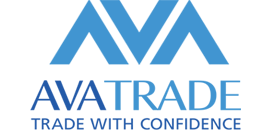
AvaTrade is also one of the very few forex brokers that offer forex options, which makes it a unique option for expert traders. However, the leverage on forex options is only 100x, much lower than the standard forex leverage of 400x.
Avatrade fees:
| Fee | Amount |
| CFD trading fee | Variable spread |
| Forex trading fee | Spread. 0.9 pips for EUR/USD |
| Crypto trading fee | Commission. 0.25% (over-market) for Bitcoin/USD |
| Inactivity fee | $50 per quarter after three months of inactivity |
| Withdrawal fee | Free |
There is no guarantee that you will make any profits with this provider. Your money is at risk.
2. XTB
A popular trading platform for stocks, currencies, and commodities that accepts a variety of assets is called XTB Broker in Europe. The platform has been accessible for more than 15 years and has more than 400,000 subscribers globally.
XTB provides more than 2100 trading instruments in total. This makes it a tempting choice for anyone wishing to diversify their portfolio and increase their market exposure. Additionally, XTB promises reasonable spreads and charges. Those who maintain positions after the market closes are subject to overnight costs according to the website.
If a member of XTB is new to trading, they can use a variety of teaching resources. Numerous tutorials and a whole trading academy are also offered. Users can also obtain comprehensive market analysis to aid in their trading decisions on XTB.
XTB also offers a sample account, which is a great way to test out the platform without spending any money. The two trading platforms offered by XTB are XStation 5 and XStation Mobile. The second option is the ideal for trading on the go.
Scalping is a great fit for XTB because of the platform’s quick execution times. XTB has no minimum deposit requirements, so you can begin trading with as little as you desire.
75% of retail investor accounts lose money when trading CFDs with this provider.
3. Trade Nation
Trade Nation is a regulated UK broker that offers CFD forex trading as well as spread betting, indices and commodities. In fact, users can access over 1000 financial instruments through the platform.
Trade Nation is regulated in the UK by the Financial Conduct Authority. The platform provides users with a good range of educational resources and technical analysis tools that can be used to inform trading. The platform also has a signals software that is also regulated by the FCA.
Users can choose to use either Meta Trader 4 or TN Trader to conduct trading through the platform. TN Trader is Trade Nations native charting platform that provides a range of indicators and charting tools. Trade Nation is available on both desktop and mobile devices in the UK.
New users can practice using the platform through the demo trading account which is free to use. There is no minimum deposit requirement for using Trade Nation and the platform also offers very low fees. This includes fixed spreads on forex trading that start at 0.6 pips.
Trade Nation:
| Fee | Amount |
| Stock trading fee | Fixed spreads |
| Forex trading fee | Fixed spreads |
| Crypto trading fee | N/A |
| Inactivity fee | Free |
| Withdrawal fee | Free |
77% of retail investor accounts lose money when trading CFDs
with this provider.
Forex Brokers in UK Comparison
A tabular representation of the different brokers, their fees, and the leverage they provide to retail traders has been provided below for your reference.
| Platform | Commissions | EUR/USD Spread | Deposit Fees | Maximum Leverage |
| Libertex | Starting at 0.006% | Zero Spreads | No deposit fee | 30x |
| AvaTrade | Zero Commissions | 0.9 pips | No deposit fee | 30x |
How to Choose The Right Forex Broker UK for You
There are several different forex brokers available out there in the world, and this number is constantly growing. With that being said, it can still be quite difficult for you to find the right broker for yourself, partially because there is so much choice that it can sometimes become confusing. Aside from the 4 brokers mentioned in this guide, there are a variety of other brokers that are available and might be suitable for you.
What this means is that at the end of the day, it is up to you to decide on which broker you wish to use and which one fits your needs. Before doing this, you need to make sure that the broker you are using is, in fact, the right one for you. There are a lot of factors that need to be considered before you decide on a broker. Choosing the right broker is arguably an overlooked part of the trading process, and yet it has a direct influence on how effectively and efficiently you can trade. Below, we have compiled a list of the different factors that you should consider before deciding on a broker to trade with.
There is no guarantee that you will make any profits with this provider. Your money is at risk.
Safety
Safety is an important consideration for any forex trader. Before you consider opening an account with any platform, you need to be sure that your information and your money is safe with them. One way to determine whether or not a broker is safe is to check whether they are regulated, and which agencies regulate them.
There is a list of agencies that make a broker safe to trade with. For the UK, this is the FCA, however, you can also trust other regulatory agencies such as the ASIC, CySEC, SEC, CFTC, or the FINRA. If the broker you are considering is regulated by any one of these agencies, then it is safe for you to proceed with using them. If not, or if they’re regulated by a lesser-known agency, proceed with extreme caution or look for another broker entirely.
Fees
The next thing that you should consider before you decide on a broker is the fees that they charge. Brokers can charge fees in two ways: a spread and a commission. A spread is the difference between the buy and the sell price of an asset at any given point in time. For example, if you’re trying to trade the USD/EUR pair, then buying and selling the asset at the same instant will result in a net loss, because the sell price is lower than the buy price. This difference between the two prices is called the spread, and it is how the broker earns money.
On the other hand, a commission is a flat charge levied on each trade or on a particular volume traded by the user. For example, a platform could charge $3 for every lot of 100,000 that you choose to trade. Usually, a platform will only have either spreads or commissions, as having both would simply be too expensive for the users. It is important for you to be aware of the fee structure that your platform charges so that you can trade accordingly and adjust your risk-reward requirements. There is no point in making small profits on every trade if all the profit you make is lost as commissions, so this is another important factor that you need to keep in mind.
Commission
If you’re trading on a platform that charges commissions, then you need to try and ensure that you minimise the fees you’re paying as much as you can. Usually, platforms that charge commissions do not charge spreads, so you will be able to trade at very tight or even no spreads, which can be very favourable. One way to minimise the fees that you pay as commissions are to make as few trades as possible without negatively impacting your profitability. For example, if you’re trading on a commission-based model, you cannot continuously trade in and out of a position since this will rack up a lot of fees that will eat into your profits.
Another thing that you need to keep in mind while trading on a platform that charges commissions is that you need to adjust your target profit accordingly. The platform will charge a commission whether or not you make a profit on your trade, therefore this should also be a part of your calculations when trying to determine what your net profit or loss is. Otherwise, there will be a discrepancy in your net balance on the platform and as per your calculations, and you might underestimate or overestimate how a particular strategy is performing.
There is no guarantee that you will make any profits with this provider. Your money is at risk.
Spreads
Spreads are another kind of fee that is charged by brokers. If you’re trading on a platform that charges spreads, then there are a few things that you need to check. First, you need to know what the average spread for a particular asset is. Usually, such platforms offer tighter spreads on major currency pairs because they have a higher volume and larger spreads on minor and exotic pairs. At the same time, you need to know if the spreads are fixed or variable. Some platforms offer fixed spreads, in that they remain unchanged throughout the day. On the other hand, some other platforms charge variable spreads, which change from time to time in the day based on the volatility and trading volume in the market.
If you’re trading using a broker that offers variable spreads, then you need to trade during periods of maximum market activity to minimise the spreads you pay. This is usually the time that both London and New York markets are open since these are the markets that are responsible for the maximum trading volume in the forex market.
Other Forex Broker Fees
You should also be on the lookout for any other forex broker fees that your platform might charge you. This could include fees such as an overnight fee for rolling over your positions from one trading day to the next. Another possible fee could be an inactivity fee, where you are charged a certain fee every month if your account remains inactive for more than a stipulated period of time. Lastly, you should also check whether your broker has any withdrawal or deposit fees. Sometimes, platforms can charge you a certain fee every time you try to add or remove funds to your account, so it is important for you to know this.
Many brokers do not have all of these fees, but all these fees can definitely affect your profitability and make the broker less competitive, so these are things you should keep in mind while trying to select a broker for your forex trading requirements.
Trading Tools
The next thing you should do is check the list of trading tools that are available for you to access on the platform. Depending on whether the platform is more suitable for beginners or professionals, you will have a variety of tools that are available to assist with the trading process.
You should check whether the tools present on the platform will enable you to carry out the strategies you wish to use and whether this is compatible with the level of expertise you have. For example, some platforms do not have the requisite tools for you to carry out advanced analysis on forex pairs, thereby limiting their use to you if you’re an experienced forex trader.
Charting Tools
If you rely on technical analysis for your trading strategies, then looking at the charting tools that are available on the platform you trade through is important. Traders who do not rely on fundamental analysis alone need to use charting tools, and this is a crucial difference-maker in the decision of which trading platform to use. Depending on what strategy you use, there are different charting tools that you might want to use, and before you decide on a platform, it is important for you to make sure that these tools are present on the platform.
As a general rule, all other things being equal, you should always choose the platform that offers the maximum choice of trading and charting tools, since this will be important if you choose to refine or change your trading strategy in the future.
There is no guarantee that you will make any profits with this provider. Your money is at risk.
Copy Trading
Copy trading is an extremely important and useful feature, especially if you’re not an expert trader yourself. It allows you to capitalize on the expertise of other traders and use their experience to profit for yourself. Copy trading is the can help you to earn money passively while you’re still trying to learn how to actively trade. As the name suggests, copy trading basically refers to you copying someone else’s trades in the same proportion.
There are several types of copy trading in forex, and they’re each done by different types of traders with varying levels of expertise. For starters, the simplest and basic copy trading refers to allocating a certain part of your portfolio to simply copy and mirror every trade that another trader makes. In this case,m you’re trading 100% passively, as all the buy and sell decisions will be made without your involvement.
Another type of copy trading is through the use of trading signals. This is similar to simple copy trading in some respects, except for one major difference. When you set a trading signal on a particular trader, you are notified every time they make a trade. You can then choose whether or not you wish to make the same trade or not. This is a semi-passive form of trading since you get to decide whether or not you wish to make the trade yourself. You can also subscribe to trading signals from traders for a small fee, where they perform technical analysis and send you signals. Another form of trading on signals is to decide on a particular set of conditions. Whenever a pair in your sample set satisfied these conditions, you will be notified and you can then decide whether or not you wish to initiate the trade.
Leverage
Leverage is another very important concept in the world of forex trading, and definitely something that you should keep in mind while selecting a platform to trade through. Essentially, grading with leverage means that you can borrow money from your broker and take on larger positions than you can afford, meaning that you get a profit. Conversely, it also means that you have a higher degree of loss if the trade goes against you.
While risk-averse traders prefer to not trade with a very high degree of leverage because they feel that it will adversely affect their portfolio to a huge extent if things go against them, a healthy degree of leverage is very important for you to be able to take on risks and make higher profits. The amount of leverage you take should match your risk profile and you need to make sure that you are comfortable with the leverage you choose. If you’re a trader who likes high leverage, then you need to choose a platform that provides you with a high degree of leverage.
Financial News and Alerts
If you’re a trader who relies, at least partly, on fundamental analysis for your trades, then this is an important aspect of a trading platform for you. While you can get financial news on any news platform too, you can get them on your trading platform since that makes it more convenient for you and you can initiate trades instantly. Usually, forex trading platforms also have a news feed and an economic calendar where they let you know about the upcoming macroeconomic events that might have an effect on the different currency pairs involved.
Some platforms even go as far as to have a system where you can get notified if major events are taking place, either via email or through a notification on your device, ensuring that you do not miss anything of importance that could affect your portfolio.
There is no guarantee that you will make any profits with this provider. Your money is at risk.
Platforms
There are several different platforms that forex traders use in order to perform technical and fundamental analysis. At the same time, some platforms are more suitable than others for certain strategies, such as automated trading strategies or trading bots. Therefore, it is important for you to check if the broker you use is compatible with other trading platforms such as the MT4 trading platform or the MT5 trading platform. Some brokers also support cTrader, which is a platform very commonly used by experienced forex traders.
Account Types
Another thing that you should definitely consider is whether or not your broker offers you multiple types of accounts that you could trade through. For example, some brokers have an option to choose between the standard, commission, and professional accounts. These accounts are different from each other in terms of the fees they charge, the functionalities they offer, and the leverage they allow you to trade using. Even if you do not end up using more than one type of account, it is always useful to trade through a broker that offers you the functionality to do so.
Payments
The last thing that you need to consider before you decide to trade through a broker is the different payment methods they support. For example, a particular broker might only support credit/debit cards or bank transfers. On the other hand, some other brokers even support e-wallets such as PayPal and Skrill.
Forex Brokers UK For Beginners
There are different forex brokers that will be useful for you for varying levels of expertise. For example, if you’re a beginner trader, then it will definitely not be very useful for you to trade through AvaTrade, because the options and tools that they offer are only useful to an experienced trader. If you’re not able to utilise their tools, this might affect the quality of your analysis and thereby result in losses. Therefore, as a beginner, you should definitely consider simpler platforms that are simpler to navigate, such as AvaTrade.
There are several reasons why these platforms are more suitable. For starters, they have a lot of variety in terms of assets, their interface is straightforward to use. At the same time, AvaTrade also allows you to use their copy trading and demo account functionalities. As you become more experienced and your strategies get refined, there are several functions and tools that you will require that are not available on these platforms. Then, you can move on to more complex and advanced platforms.
Conclusion
Forex trading is inherently risky, and therefore, you need to be prepared for it before you risk your own capital. Aside from your preparation and strategies, a very important factor in deciding how successful you will be as a trader is choosing the right broker. Depending on your requirements, there are different brokers that would be suitable for your needs. Consider AvaTrade, which is suitable for all kinds of trading needs and requirements.
